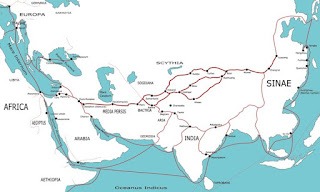Under the Swaying Palms
Nazir 47
Tadmor/Palmyra seems to derive its name from the tamar,
the palm tree. It is a desert oasis on one of the main caravan routes through
the Syrian Desert:
(Wikipedia)
Because of its strategic location, Tadmor was already settled
in prehistoric times and by Biblical times it beame a main stop on the caravan
route. It was settled by Arameans and Arabs and later became a Hellenized city,
ultimately conquered by Rome. Its
position on the border between the Roman and the Parthian empires meant it was
sought after and a strong ruler could dictate his own terms. Or, in one case,
her own terms. Palmyra’ s most famous
ruler was a queen named Zenobia who ruled in the 3rd century CE. She
became so powerful that she rebelled against Rome and conquered Egypt before
she was caught and exiled.
coin depicting Zenobia (Wikipedia)
Tadmor was a wealthy, cosmopolitan city. The residents
spoke Greek but also Palmyrean, an Aramac dialect with its own alphabet:
They built a number of fabulous pagan temples, some of
which have been barbarically destroyed by ISIS. This is the Baalshamin palace,
discovered almost intact:
(Wikipedia)
Like other large and diverse Middle Eastern cities,
Tadmor had a Jewish population. We hear about them not only in rabbinic
literature but in archaeology as well. In a 1930’s expedition to Palmyra, Professor
Eliezer Sukienik photographed a house that had four verses of the Shema
chiseled into a doorframe:
(Times of Israel)
Closer to home, in the amazing necropolis of Bet Shearim
in Israel’s north, a number of sarcophagi have inscriptions that tell us their
owners were brought here from Palmyra to be buried. One example is the
inscription that refers to the sons of Leontios the banker from Palmyra.
Miriam was fortunate enough to come to Eretz Yisrael not
in death but as a living Nazirite woman who visited the Temple.
For more information on the Jewish story of Palmyra see: http://www.timesofisrael.com/hebrew-inscriptions-jewels-of-palmyras-jewish-past-may-be-lost-forever/








Comments
Post a Comment